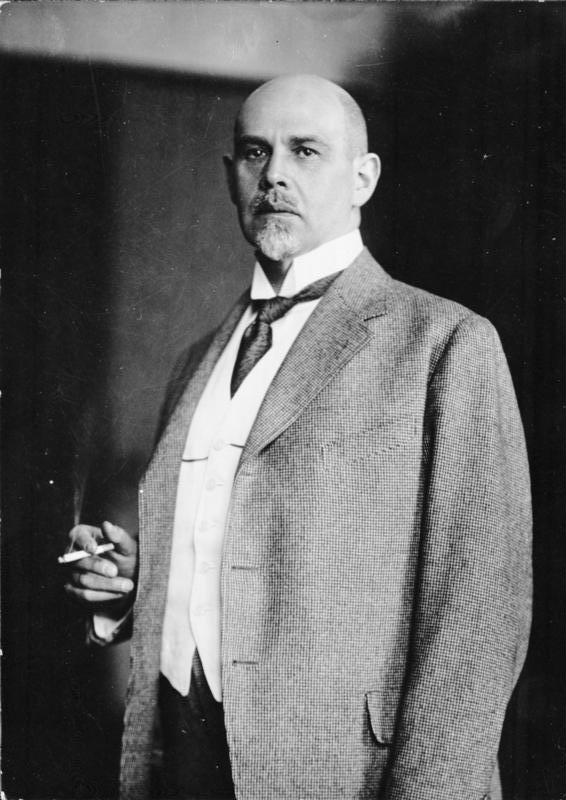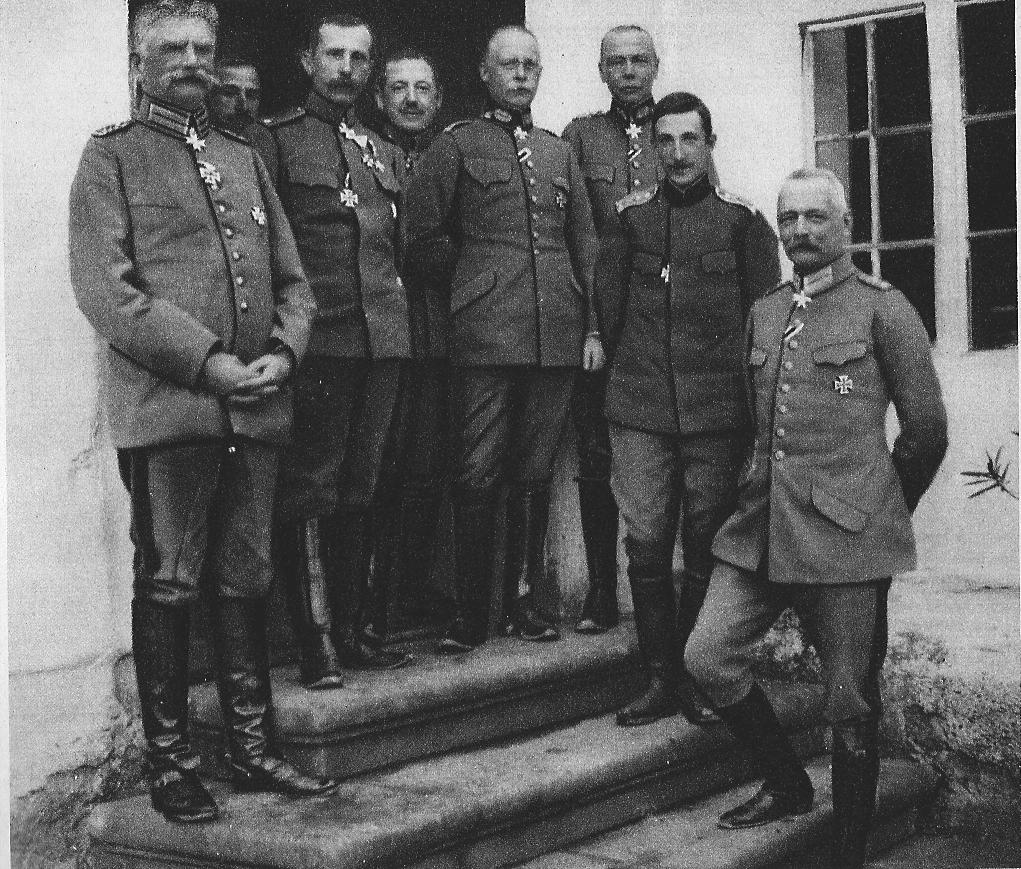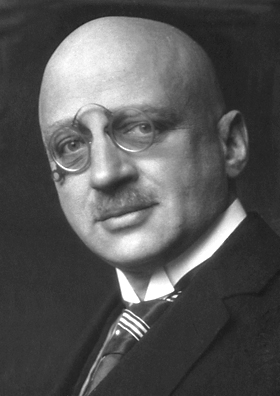|
Kriegsrohstoffabteilung
The Kriegsrohstoffabteilung (War Raw Materials Department) was an organisation set up in Germany to facilitate access to raw materials for the German military. Walther Rathenau and Wichard von Moellendorff proposed setting up an organisation to centrally manage all war-essential goods and raw materials. This led the Prussian War Minister Erich von Falkenhayn to decree the establishment of the Kriegsrohstoffabteilung (KRA) on 13 August 1914. The KRA reopened factories which had shut down because they were not economically viable. They also promoted the substitution of more readily available materials for scarce materials. One example was the use of the Haber-Bosch process of ammonia production, when the Allied Powers' blockaded the importation of Chilean saltpeter. By 1918 it had 2,500 employees. Walther Rathenau was the first president of KRA, a position he held up until his resignation at the end of March 1915. He was replaced by Joseph Koeth Joseph Koeth (7 July 1870 – ... [...More Info...] [...Related Items...] OR: [Wikipedia] [Google] [Baidu] |
Joseph Koeth
Joseph Koeth (7 July 1870 – 22 May 1936) was a German military officer and politician. During World War I he served as head of the Kriegsrohstoffabteilung (War Raw Materials Department – KRA) of the Prussian Ministry of War created by Walther Rathenau. After the German revolution of 1918, Koeth was in charge of economic demobilisation as a member of the first democratically elected government under Philipp Scheidemann. He again served briefly as a minister of the Weimar Republic under Gustav Stresemann in 1923. Early life Joseph Koeth was born on 7 July 1870 in Lohr a. Main, Lower Franconia, then a part of the Kingdom of Bavaria. His father, Joseph (1829-1913) was a lawyer. His mother, Susanne (1845- 1903), came from a farming family. He was married to Helene (1874-1958), née Fenkohl from Eastern Prussia (a sister of , a painter). They had one son, who was killed in war. Military career After serving for eleven years in the Bavarian Army, Koeth joined the Prussian Army in ... [...More Info...] [...Related Items...] OR: [Wikipedia] [Google] [Baidu] |
Walther Rathenau
Walther Rathenau (29 September 1867 – 24 June 1922) was a German industrialist, writer and liberal politician. During the First World War of 1914–1918 he was involved in the organization of the German war economy. After the war, Rathenau served as German Foreign Minister (February to June 1922) of the Weimar Republic. Rathenau initiated the 1922 Treaty of Rapallo, which removed major obstacles to trading with Soviet Russia. Although Russia was already aiding Germany's secret rearmament programme, right-wing nationalist groups branded Rathenau a revolutionary, also resenting his background as a successful Jewish businessman. Two months after the signing of the treaty, Rathenau was assassinated by the right-wing paramilitary group Organisation Consul in Berlin. Some members of the public viewed Rathenau as a democratic martyr; after the Nazis came to power in 1933 they banned all commemoration of him. Early life Rathenau was born in Berlin to Emil Rathenau, a prominent ... [...More Info...] [...Related Items...] OR: [Wikipedia] [Google] [Baidu] |
Germany
Germany,, officially the Federal Republic of Germany, is a country in Central Europe. It is the second most populous country in Europe after Russia, and the most populous member state of the European Union. Germany is situated between the Baltic and North seas to the north, and the Alps to the south; it covers an area of , with a population of almost 84 million within its 16 constituent states. Germany borders Denmark to the north, Poland and the Czech Republic to the east, Austria and Switzerland to the south, and France, Luxembourg, Belgium, and the Netherlands to the west. The nation's capital and most populous city is Berlin and its financial centre is Frankfurt; the largest urban area is the Ruhr. Various Germanic tribes have inhabited the northern parts of modern Germany since classical antiquity. A region named Germania was documented before AD 100. In 962, the Kingdom of Germany formed the bulk of the Holy Roman Empire. During the 16th ce ... [...More Info...] [...Related Items...] OR: [Wikipedia] [Google] [Baidu] |
Wichard Von Moellendorff (engineer)
Wichard von Moellendorff (3 October 1881, Hong Kong – 4 May 1937, Berlin) was a German engineer and economist. He is most widely known for his involvement in economic policy during and after the First World War. He was also involved in materials research. In 1916 Moellendorff developed the concept of "social economy" which was a variant of socialism in which rather than eliminating private property subordinates private interests to the society as a whole. He saw that this might be implemented by an organisation like Bismarck's National Economic Council (Volkswirschaftsrat). Moellendorff saw this as a way of establishing a "rejuvenated middle classes". Following the German Revolution of November 1918, von Moellendorff was under-secretary to the ''Reichsminister für Wirtschaft'' (Minister for Economic Affairs) Rudolf Wissell. Together they were involved in developing a programme of "practical socialisation" based on corporatist principles which they claimed was superior both t ... [...More Info...] [...Related Items...] OR: [Wikipedia] [Google] [Baidu] |
Prussian Ministry Of War
The Prussian War Ministry was gradually established between 1808 and 1809 as part of a series of reforms initiated by the Military Reorganization Commission created after the disastrous Treaties of Tilsit. The War Ministry was to help bring the Army under constitutional review, and, along with the General Staff systematize the conduct of warfare. Gerhard von Scharnhorst, the most prominent and influential of the reformers, served as acting war minister from roughly 1808 until 1810 (he was also Chief of the General Staff). History The War Ministry was established on 25 December 1808, replacing the old military institutions. The Ministry consisted of two departments. The first department was responsible for the command and condition of the army, the second for its financial administration. At first, no War Minister was appointed due to the resistance of Frederick William III. Gerhard von Scharnhorst became head of the first department (the General War Department; ''Allgemeines K ... [...More Info...] [...Related Items...] OR: [Wikipedia] [Google] [Baidu] |
Erich Von Falkenhayn
General Erich Georg Sebastian Anton von Falkenhayn (11 September 1861 – 8 April 1922) was the second Chief of the German General Staff of the First World War from September 1914 until 29 August 1916. He was removed on 29 August 1916 after the failure at the Battle of Verdun, the opening of the Battle of the Somme, the Brusilov Offensive and the entry of Romania into the war on the Allied side undid his strategy to end the war before 1917. He was later given important field commands in Romania and Syria. His reputation as a war leader was attacked in Germany during and after the war, especially by the faction supporting Paul von Hindenburg. Falkenhayn held that Germany could not win the war by a decisive battle but would have to reach a compromise peace; his enemies said he lacked the resolve necessary to win a decisive victory. Falkenhayn's relations with the Chancellor Theobald von Bethmann-Hollweg were troubled and undercut Falkenhayn's plans. Early life Falkenhayn was b ... [...More Info...] [...Related Items...] OR: [Wikipedia] [Google] [Baidu] |
Haber-Bosch
The Haber process, also called the Haber–Bosch process, is an artificial nitrogen fixation process and is the main industrial procedure for the production of ammonia today. It is named after its inventors, the German chemists Fritz Haber and Carl Bosch, who developed it in the first decade of the 20th century. The process converts atmospheric nitrogen (N2) to ammonia (NH3) by a reaction with hydrogen (H2) using a metal catalyst under high temperatures and pressures: : \ce \quad \Delta H^\circ = -91.8~\text Though this reaction is exothermic (i.e. it releases energy, albeit not very much), it results in a decrease in entropy, which is the central reason why it is very challenging to carry out. Before the development of the Haber process, it had been difficult to produce ammonia on an industrial scale, with early methods, such as the Birkeland–Eyde process and the Frank–Caro process, all highly inefficient. During World War I, the Haber process provided Germany with a sou ... [...More Info...] [...Related Items...] OR: [Wikipedia] [Google] [Baidu] |
Ammonia
Ammonia is an inorganic compound of nitrogen and hydrogen with the formula . A stable binary hydride, and the simplest pnictogen hydride, ammonia is a colourless gas with a distinct pungent smell. Biologically, it is a common nitrogenous waste, particularly among aquatic organisms, and it contributes significantly to the nutritional needs of terrestrial organisms by serving as a precursor to 45% of the world's food and fertilizers. Around 70% of ammonia is used to make fertilisers in various forms and composition, such as urea and Diammonium phosphate. Ammonia in pure form is also applied directly into the soil. Ammonia, either directly or indirectly, is also a building block for the synthesis of many pharmaceutical products and is used in many commercial cleaning products. It is mainly collected by downward displacement of both air and water. Although common in nature—both terrestrially and in the outer planets of the Solar System—and in wide use, ammonia is both caust ... [...More Info...] [...Related Items...] OR: [Wikipedia] [Google] [Baidu] |
Allies Of World War I
The Allies of World War I, Entente Powers, or Allied Powers were a coalition of countries led by France, the United Kingdom, Russia, Italy, Japan, and the United States against the Central Powers of Germany, Austria-Hungary, the Ottoman Empire, Bulgaria, and their colonies during the First World War (1914–1918). By the end of the first decade of the 20th century, the major European powers were divided between the Triple Entente and the Triple Alliance. The Triple Entente was made up of France, Britain, and Russia. The Triple Alliance was originally composed of Germany, Austria–Hungary, and Italy, but Italy remained neutral in 1914. As the war progressed, each coalition added new members. Japan joined the Entente in 1914 and after proclaiming its neutrality at the beginning of the war, Italy also joined the Entente in 1915. The term "Allies" became more widely used than "Entente", although France, Britain, Russia, and Italy were also referred to as the Quadruple Entente ... [...More Info...] [...Related Items...] OR: [Wikipedia] [Google] [Baidu] |
Nitratine
Nitratine or nitratite, also known as cubic niter (UK: nitre), soda niter or Chile saltpeter (UK: Chile saltpetre), is a mineral, the naturally occurring form of sodium nitrate, NaNO3. Chemically it is the sodium analogue of saltpeter. Nitratine crystallizes in the trigonal system, but rarely occurs as well formed crystals. It is isostructural with calcite. It is quite soft and light with a Mohs hardness of 1.5 to 2 and a specific gravity of 2.24 to 2.29. Its refractive indices are nω=1.587 and nε=1.336. The typical form is as coatings of white, grey to yellowish brown masses. The rare crystals when found typically have the scalenohedral form of the calcite structure. It is found only as an efflorescence in very dry environments. It is very soluble in water such that it is deliquescent and will absorb water out of the air and turn into a ''puddle'' of sodium nitrate solution when exposed to humid air. Nitratine was once an important source of nitrates for fertilizer and other ... [...More Info...] [...Related Items...] OR: [Wikipedia] [Google] [Baidu] |
German Empire In World War I
German(s) may refer to: * Germany (of or related to) **Germania (historical use) * Germans, citizens of Germany, people of German ancestry, or native speakers of the German language ** For citizens of Germany, see also German nationality law **Germanic peoples (Roman times) * German language **any of the Germanic languages * German cuisine, traditional foods of Germany People * German (given name) * German (surname) * Germán, a Spanish name Places * German (parish), Isle of Man * German, Albania, or Gërmej * German, Bulgaria * German, Iran * German, North Macedonia * German, New York, U.S. * Agios Germanos, Greece Other uses * German (mythology), a South Slavic mythological being * Germans (band), a Canadian rock band * "German" (song), a 2019 song by No Money Enterprise * ''The German'', a 2008 short film * "The Germans", an episode of ''Fawlty Towers'' * ''The German'', a nickname for Congolese rebel André Kisase Ngandu See also * Germanic (other) * Germa ... [...More Info...] [...Related Items...] OR: [Wikipedia] [Google] [Baidu] |






-3D-balls.png)